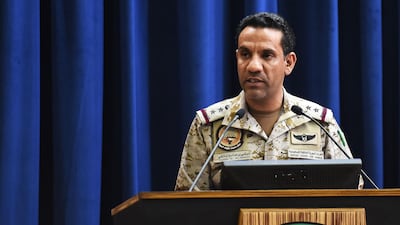Eight members of Lebanon’s Hezbollah were killed in north Yemen, the Arab Coalition said on Monday in the first public confirmation that members of the Iranian backed Lebanese force is actively involved in the conflict.
"The coalition killed 41 terrorist elements in Maran and destroyed their vehicles and equipment," said coalition spokesman Col Turki Al Malki in a statement. "Among the dead were eight members of Lebanese Hezbollah, including a commander."
No further details were disclosed other than they took place near the town of Maran in Saada province, a stronghold of Yemen's Iran-backed Houthi rebels.
The deaths near the Saudi Arabian border came as the coalition pushed forward its offensive to recapture the Houthi controlled Red Sea port city of Hodeidah further south.
Coalition spokesman Col Al Malki said that although he has not previously disclosed such Hezbollah casualties it was "not the first time". Hezbollah has previously denied it was in Yemen helping the Houthis.
UN envoy to Yemen Martin Griffiths was due to arrive in the southern city of Aden on Wednesday for talks with Yemeni President Abdrabu Mansur Hadi.
"He will only be there for a few hours and the talks will focus on the situation in Hodeidah and [on] averting any military operation on the port," one official told Reuters.
Mr Griffiths briefed European Union foreign ministers on his peace efforts on Monday. The ministers called for a political settlement to the war and offered to increase humanitarian aid as needed.
The Arab coalition — which includes Saudi Arabia and the UAE — launched an offensive on Hodeidah on June 13 to flush out the rebels and box them into Sanaa, cutting off their supply lines and forcing them to work on a political process. The coalition intervened in March 2015 at the request of the internationally-recognised government of Mr Hadi.
The Hodeidah port is an entry point for vital aid deliveries and commercial goods but the coalition also says it is being used by the Houthis to smuggle in weapons provided by Iran.
UAE's Minister of State for Foreign Affairs Dr Anwar Gargash has said the assault aimed "to help the UN envoy in his last chance to convince the Houthis to withdraw unconditionally from the city and avoid any confrontation".
He reiterated that the port remains operational as ships continue to register and come in to unload aid.
“We have planned diligently around the humanitarian side; the operation should allow the port to function as long as we can,” he said.
_______________
Read more
Hadi and allies back coalition as fighting edges closer to Hodeidah city
Media to be granted more access to Yemen war under new coalition strategy
_______________
The Yemeni government and the coalition say that the Houthis must completely withdraw from the city and hand over control to the UN. However, the rebels have so far only agreed to share control of the key port with the UN.
Hezbollah, an Iranian backed Lebanese force has been fighting in a number of Arab countries, including Syria where it was one of the earliest and most significant backers of President Bashar Al Assad.
In a November interview with CNN, Saudi Arabia's Foreign Minister Adel Al Jubeir accused Hezbollah of firing a missile provided by Iran at the kingdom from Yemeni territory. Hezbollah is believed to possess an arsenal of tens of thousands of rockets and is highly skilled in firing them having launched hundreds during the 34-day 2006 Israel-Hezbollah war but have denied the coalition's claim saying that the Houthi rebels were capable of such action alone.
Riyadh and Tehran have for decades stood on opposing sides of conflicts in the Middle East, including in Yemen and Syria.
More than 22 million people in Yemen are in need of aid, including 8.4 million who are at risk of starvation, according to the UN, which considers the country to be the world's worst humanitarian crisis.
The conflict has left up to 10,000 people dead in Yemen, already the Arab world's poorest country.

